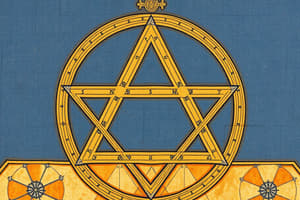Podcast
Questions and Answers
What branch of mathematics focuses on the relationships between different parts of triangles?
What branch of mathematics focuses on the relationships between different parts of triangles?
- Algebra
- Probability and Statistics
- Calculus
- Geometry (correct)
Which mathematical field deals with continuous change and measurement of rates?
Which mathematical field deals with continuous change and measurement of rates?
- Trigonometry
- Geometry
- Calculus (correct)
- Algebra
What is the main characteristic of non-Euclidean geometry?
What is the main characteristic of non-Euclidean geometry?
- It upholds all foundational assumptions of Euclid's Elements
- It only deals with circles and spheres
- It focuses solely on straight lines and points
- It challenges some of Euclid's foundational assumptions (correct)
What type of mathematics is primarily used for predictions and decisions based on data?
What type of mathematics is primarily used for predictions and decisions based on data?
What is the main focus of arithmetic?
What is the main focus of arithmetic?
Which ancient civilizations were mentioned in the text as contributors to the development of mathematics?
Which ancient civilizations were mentioned in the text as contributors to the development of mathematics?
What tools did early mathematicians use for calculations?
What tools did early mathematicians use for calculations?
What led to the ability to record mathematical ideas on paper?
What led to the ability to record mathematical ideas on paper?
How does math influence our daily lives according to the text?
How does math influence our daily lives according to the text?
Which branch of mathematics includes operations like fractions and percentages?
Which branch of mathematics includes operations like fractions and percentages?
Study Notes
Math: The Language of Numbers and Shapes
Mathematics, often simply referred to as math, is a field of study that has been around since ancient times. It deals with numbers, quantities, shapes, logic, probability, and structure through reasoned argument and experimental evidence. Despite its abstract nature, math is deeply rooted in our daily lives, influencing everything from finance and technology to art and music.
Historical Development of Mathematical Concepts
The history of mathematics can be traced back thousands of years, beginning with early civilizations such as the Egyptians, Babylonians, Indians, Greeks, Mayas, and Chinese. Early mathematicians used counting sticks, abaci, and sand piles to perform calculations. Over time, mathematical symbols were invented, which allowed more complex ideas to be expressed more easily. This development eventually led to the creation of written numerals, allowing humans to record their thoughts on paper instead of relying solely on oral tradition or physical objects.
Types of Math
Mathematics is divided into several branches, each focusing on different aspects of the subject:
-
Arithmetic: Arithmetic is the branch of mathematics concerned with numerical quantities, operations involving them, and relations between them. It includes basic elements like addition, subtraction, multiplication, division, fractions, decimals, percentages, and so on.
-
Algebra: Algebra is one of the most fundamental areas of mathematics, dealing with generalizations of arithmetic operations and formulas using letters (often called variables) to represent unknown values. In algebra, equations with multiple unknowns need to be solved simultaneously.
-
Geometry: Geometry involves studying properties of points, lines, surfaces, and solids, all of which are either axiomatically defined or intuitively formed. Two main types of geometry are Euclidean and non-Euclidean geometries. Non-Euclidean geometry challenges some of the foundational assumptions made by Euclid's Elements.
-
Trigonometry: Trigonometry is a branch of mathematics that focuses on the relationships between different parts of triangles, primarily involving angles and lengths of sides. It also involves other curved geometric forms like circles and spheres.
-
Calculus: Calculus deals with continuous change and is often used to measure how quickly something is changing or how much something changes over a period of time. It is used to discover the slope of a graph, find the area under a curve, or discover the size of a small area.
-
Probability and Statistics: Probability and statistics are concerned with the collection, organization, analysis, interpretation, and presentation of data. They are used to make predictions and decisions based on data, rather than instinct or intuition.
Applications of Math
Math is used in a wide range of fields and has many practical applications:
- Science and Technology: Math is essential for understanding the natural world and designing technological devices.
- Social Sciences: Math is used in fields like economics, psychology, and sociology to study human behavior and make predictions.
- Engineering: Math is fundamental to understanding the physical world and designing structures, machines, and systems.
- Art and Music: Math is used in art and music to create patterns, rhythms, and harmonies.
Mathematical Symbols and Notation
Mathematical symbols are used to represent mathematical ideas and quantities in a concise and unambiguous manner. Some common symbols include:
- =: Equal to
- +: Addition
- -: Subtraction
- x: Multiplication
- ÷: Division
The Role of Math in Daily Life
Math is intrinsic to many aspects of daily life, even if it's not immediately apparent:
- Financial Planning: Math is used to balance budgets, calculate interest rates, and make investments.
- Cooking and Baking: Math is used to measure ingredients accurately and ensure that recipes turn out correctly.
- Sports and Games: Math is used to analyze game statistics, calculate the odds of winning, and evaluate player performance.
- Crafts: Math is used to create patterns, calculate measurements, and ensure that projects come out correctly.
Challenges in Mathematics
Math presents many challenges, such as solving complex equations, proving theorems, and understanding advanced concepts. These challenges can be daunting but can also be rewarding when solved.
The Importance of Math Education
Math education is crucial for students because it teaches them critical thinking, problem-solving, and logical reasoning skills that are applicable in various fields. It also helps students develop a strong foundation for higher-level math courses and prepares them for future careers where math skills will be essential.
In conclusion, math is a powerful tool that helps us understand the world around us. Whether you're a professional mathematician or someone who uses it every day, math is essential to our lives.
Studying That Suits You
Use AI to generate personalized quizzes and flashcards to suit your learning preferences.
Description
Delve into the fascinating realm of mathematics, from its historical development to its various branches and real-world applications. Discover the role of math in daily life, the importance of math education, and the challenges it presents. Mathematics is not just a subject but a universal language that shapes our understanding of numbers, shapes, logic, probabilities, and structures.






